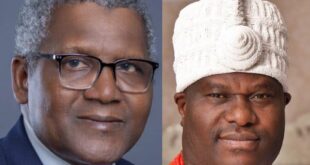NIGERIA – The fuel scarcity crisis in Nigeria has intensified as filling stations in Lagos, Abuja and other areas in the country struggle to meet demand, leading to widespread closures and long queues.
In Lagos, motorists faced extensive waits at stations running low on fuel due to panic buying across the state.
Meanwhile, unauthorized vendors took advantage of the situation, selling fuel along major roads like Ikorodu Road and Marina, where regulatory enforcement was notably absent.
Abuja mirrored the crisis, with more stations closing their doors as supplies dwindled, prompting black market prices to soar to N1,500 per litre.
While some stations like NNPC Retail and NIPCO managed to continue operations in certain areas like Karu and the Central Business District, many others, including major marketers, remained shuttered.
The NNPC Limited attributed the supply difficulties to logistical challenges exacerbated by coastal area flooding, extending the crisis into its sixth day.
Despite reassurances from government officials about resolving these challenges, the fuel shortage persists, impacting daily life and transportation across the affected regions.
Senator Heineken Lokpobiri, the Minister of State for Petroleum Resources (Oil), acknowledged the frustrations faced by Nigerians amidst the ongoing fuel queues in cities like Abuja.
In a statement posted on his verified social media handle X, the Minister attributed the disruptions to recent flooding along trucking routes and other logistical challenges exacerbated by weather conditions.
“We are aware of the inconvenience caused by the fuel queues,” he assured. “Our dedicated team is working tirelessly to restore normal fuel supply as swiftly as possible. Your patience and understanding during this time are greatly appreciated”, he said.
However, Festus Osifo, President General of the Trade Union Congress (TUC) and President of the Petroleum and Natural Gas Senior Staff Association of Nigeria (PENGASSAN), highlighted the urgency for the Federal Government to address the logistics and weather-related issues hindering fuel supply across Nigeria.
He made these remarks during an interview at the ongoing PENGASSAN Women Annual Convention (PWAC) in Abuja, emphasizing the need for immediate action to alleviate the situation faced by motorists and other users of petroleum products nationwide.
Festus Osifo, President of the Trade Union Congress (TUC) and President of the Petroleum and Natural Gas Senior Staff Association of Nigeria (PENGASSAN), emphasized that Nigeria will continue to face recurrent fuel scarcity unless structural reforms are implemented.
Speaking recently, Osifo highlighted the critical issues contributing to the challenges in fuel distribution.
He pointed out the severe impact of infrastructure deficiencies, citing examples of roads like the Ayele to Auchi route that often strand travelers for days due to poor conditions.
“These routes are crucial for transporting fuel from places like Port Harcourt to cities like Abuja, illustrating how infrastructure failures disrupt the supply chain, Osifo posited.
Osifo advocated for technological advancements, suggesting that Nigeria should emulate countries that use pipelines and rail networks for petroleum product transportation instead of relying heavily on tanker trucks.
He emphasized the importance of repairing and modernizing pipelines and depots across the country to establish reliable fuel reserves closer to urban centers.
In his view, enhancing these infrastructural elements would ensure consistent fuel supply regardless of road conditions, enabling the replenishment of reserves during favorable periods and maintaining stability in fuel distribution.
Osifo concluded by urging decisive action to overhaul Nigeria’s petroleum logistics infrastructure to mitigate future fuel scarcity episodes effectively.
In a related development, Billy Gillis-Harry, National President of the Petroleum Products Retail Outlets Owners Association of Nigeria (PETROAN), described the current fuel situation as dire, with snake-like queues observed at filling stations nationwide.
The congestion has exacerbated traffic and stranded thousands of commuters at bus stops, where transport fares have skyrocketed.
Gillis-Harry noted discrepancies in fuel prices across different states, citing examples of independent marketers in Lagos raising prices from approximately ¦ 615 to over ¦ 650 per litre.
He confirmed that while NNPC’s prices remained stable around ¦ 570 per litre in Lagos, other regions experienced higher rates due to challenges in sourcing from depots struggling with supply issues.
Despite ongoing upgrades to NNPC’s platform, Gillis-Harry assured the public that alternative arrangements were being made to ensure continuous petroleum product availability.
He emphasized that the current challenges primarily stemmed from supply constraints, underscoring the critical need for robust logistical improvements to stabilize the market and prevent future crises.
Billy Gillis-Harry, National President of the Petroleum Products Retail Outlets Owners Association of Nigeria (PETROAN), clarified that fuel retailers are not to blame for the current price hikes, emphasizing that they only sell what is supplied to them without involvement in importation or refining processes.
He highlighted the increasing complexity and costliness of logistics, citing shortages and escalating prices of diesel used by trucks for fuel transportation across the country.
Gillis-Harry advocated for government subsidies on fuel distribution logistics to alleviate these challenges.
Addressing concerns about price gouging, he asserted that the highest reasonable price for petrol should range between ¦ 620 to ¦ 680 per litre at depots in Lagos, Delta, Calabar, and Rivers State.
He explained that additional costs incurred during transportation from depots to various states should be considered to prevent excessively high retail prices like ¦ 1,000 per litre.
Gillis-Harry attributed the limitations in fully operationalizing deregulation of the petroleum sector to forex shortages hindering adequate product imports.
He acknowledged the importance of importing petroleum products until local refineries can effectively meet national demand.
Despite these challenges, he reassured Nigerians that efforts were underway to resolve the current fuel shortages.
He urged patience and understanding from the public during this period of disruption in fuel supply.
*Do you want to advertise or share a story with us or need publicity for a product, service, or event? Contact us on WhatsApp +2348038525526 & +2349030145882 Email: startrendinter@gmail.com
 Startrend International Magazine For Your Latest News And Entertainment Gists
Startrend International Magazine For Your Latest News And Entertainment Gists





